Entertainment
A History of Magic in Manchester
The article below, written by the Order of the Magi’s past editor Bayard Grimshaw, has been reproduced from “Magi Magoria” published by Supreme Magic in 1974, and covers a very brief history of Magic in Manchester and of course the Order of the Magi – one of the oldest societies for performing magicians in the world, up until the publication date.
Perhaps, one day, our current members could put together a further article dealing with the history of Magic in Manchester from 1974 to the present date…
MAGIC IN MANCHESTER
(Not just we Magi but also)
BAYARD GRIMSHAW
Understandably, the origins of Magic are obscure and a matter for speculation. We may assume that among our remote ancestors, as far back as the beginnings of community life, there came to the fore the “wise men”, those whose special knowledge of natural principles enabled them to keep a step ahead of the rest and to astound their fellows by their ability to bring about strange and awe-inspiring results. They would use their power for the common good, or for personal prestige, and perhaps – who knows ? – to amuse and entertain, too.
The first written record of a magical performance as we understand the term today was contained In the Westcar Papyrus, the present whereabouts of which are in doubt: it described a display of Magic given by one Dedi, at the court of King Cheops in Egypt nearly six thousand years ago. Of the precise achievements of the Magi of the Ancient East we know little, though their reputation as wonder-workers has come down to us over the years, and inspired the title of the Order of the Magi.
Of Magic as entertainment during the centuries of the Greek and Roman civilisations we have ample evidence. A Greek writer of the third century has left us a detailed description of a performance of the sleight-of-hand feat known as the Cups and Balls, which, he wrote, “rendered me almost speechless and made me gape with surprise”; the routine he described might pass for one of the present day. Seneca, the great Roman philosopher, wrote of the same feat, and sensibly, wise man that he was, added: “If I get to know how a trick is done, I lose my interest in it”. In those days it was done with round white pebbles and wine-cups, and it was from the name of the latter that the performer came to be known by the Romans as an “acetabularius”.
So it is plausible to assume that the soldiers who garrisoned the Roman fort of Mamucium on the banks of the Irwell may well have been entertained, at times when the rude Brigantes ceased from troubling, by gifted comrades or by itinerant acetabularii. To their days, the first century A.D., we can ascribe the probable beginnings of Magic in Manchester.
As a centre of trade the city must have attracted, especially on market days, many of the travelling “jugglers” who made their way from town to town from the eighth to the sixteenth centuries. Probably such performers as Banks and Richardson in the seventeenth century, and Fawkes, Pinchbeck, Yeates, Comus and Jonas in the early eighteenth, visited Manchester, for they are known to have toured the provinces. Breslaw, the German who achieved such success in England, certainly appeared here several times between 1773 and 1782; so, almost certainly, did Katterfelto and probably too the illustrious Pinetti.
By the time we come to the nineteenth century we have more precise information. Ingleby visited Manchester in 1808; Philippe (Talon) in 1839, Dobler in 1842; the famed Anderson, the “Wizard of the North,” in 1838-39 and again in 1841; Jacobs in 1850 and probably earlier, between 1834 and 1838; while Buck had a “record run” of a hundred consecutive nights in Manchester in 1851. The first Bosco was here about 1857, and Frikell in 1858.
But one instance of Magic in Manchester, looking back a century or so, stands out above the rest: that visit of Robert-Houdin, “father of modern magic”, to the Theatre Royal in 1848. An original playbill, announcing the event, is a treasured possession of the Order of the Magi, and is handed into the care of each new President on the occasion of his installation. “The theatre in this city is immense”, wrote Robert-Houdin in his Memoirs: “It can hold an entire people … Twelve hundred spectators scarcely filled the pit”. And he goes on to devote seven pages to an account of his successful first night.
And so we come to the years of the great illusionists, all of whom visited Manchester on many occasions and attracted huge audiences to the numerous theatres of the city and its surrounding districts. Manchester was not only a stronghold of entertainment but a place of theatrical stores and workshops, the centre of the great Broadhead Tour; it was said that one could lodge in Rumford Street or Brunswick Street and do a year’s work on the halls, travelling back to one’s “digs” each night by tramcar.
The latter years of the last century, and the first decades of the present, were a golden age of Magic; the art, ever popular with the entertainment-loving public, flourished as never before. Most variety bills had their magician, be he merely a front-cloth act with no more of a repertoire than a few card sleights; but the princes of the profession were those who toured a full show, with their lavish publicity and their own scenery, their regiments of well-trained assistants, their floating ladies and their vanishing ladies and their incredible productions and transpositions.
Hartz, Servais Le Roy, Rameses; Devant, Carl Hertz, De Biere, Lingha Singh; Lafayette, Chung Ling Soo, Houdini, Goldin, The Great Carmo – their names spelt glamour and mystery. Their interviews appeared in the press, articles about them in the weekly and monthly magazines. Their advent to a local theatre, heralded by intriguing posters on the hoardings, aroused delicious anticipation: one could hardly wait for the week to come. And their mysteries provided ample material for speculation and discussion for weeks afterwards.
We must not forget that alongside of these “greats” flourished the lesser lights of the concert and the children’s party, the ladies’ evening, the soiree and the conversazione. Such were the majority of the founders and early members of the Order of the Magi. They basked in the limelight touched off by their more famous elder brethren, they were in great demand and their date books were full.
Came the time when the variety theatres reeled under the successive blows of the silent cinema and the “talkies”, radio and eventually television; when recording “stars” topped the bills in the larger of what few Hippodromes and Palaces survived, “strip” shows the smaller, leaving scant space for the stage magician. For a while Dante, Kalanag, Lyle, Murray, Levante and a few more tried to keep alive the tradition of the big magical show in this country. But in the end it was largely left to the magical societies to keep Magic alive.
At the turn of the century magicians from all over the world, and local magicians in particular, amateur and professional, little-known and well known, used to foregather on Sunday afternoons and evenings at the home of Harry Whiteley at 86 Medlock Street. Mr. Whiteley, performer, author and magical dealer, had countless friends in Magic; he was British correspondent of ‘The Sphinx’, the great American magical monthly. Famous illusionists, touring the provinces, would when possible break their journeys in Manchester in order to spend an hour or two at Harry Whiteley’s; others, working within travelling distance, would come over just for the pleasure of spending a short time with kindred spirits.
Such a one was Chung Ling Soo (W.E. Robinson). Believed by all save those in the know to be genuinely Chinese, he was actually born in America, of Scottish ancestry; but he seemed to have a special affection for Manchester, where he had many friends, and for many years he had a store and workshop at Bolton, where his colleague Ritherdon designed and made much of his elaborate apparatus and scenery.
These informal gatherings led to the formation of an equally informal society, “The Friends of Magic;” Soo was the President. Though this association did not directly lead to the formation of the Order of the Magi, it no doubt had an indirect influence, and it was, as far as we know, the first banding together of magicians in the Manchester area.
It was probably at Harry Whiteley’s house that G. W. Panter, M. A. , a keen student of magic a member of the recently formed Magic Circle, met fellow conjurors and, realising their strength, saw the desirability of forming in Manchester a more formally constituted society. At first he consulted with the Council of the Magic Circle, with a view to instituting a northern branch of that body; this was found, for several reasons, to be impracticable. And so, emboldened by news of the success of two magical societies in the U.S.A. , the Society of American Magicians and the Detroit Circle, and two in England, the British Magical Society in Birmingham and the Northern Magical Society – now long defunct – in Liverpool, as well as the Magic Circle itself, Mr. Panter embarked upon the formation of a new society altogether.
An advertisement was placed in the local papers, and a notice displayed in Waite’s magic-shop-cum-barber’s in Peter Street near to the old Tivoli Theatre, inviting those interested to meet on the 11th March, 1909, at the Cities Hotel, Deansgate. About thirty conjurors attended; support was assured, and with enthusiasm the new Society was duly formed. Mr. Panter was elected President; Mr. Waite became Treasurer and Librarian; and Mr. T. H. Halsall was the first Secretary. On second thoughts he found that he could not spare the necessary time, and two days later he was succeeded by J. W. Riley (“De Meglio”), a well-known performer who managed Wiles’ conjuring department and entertainment bureau for many years.
Among those present was a young man named Ronald Bumby, who became President in 1967 and is still happily with us in 1977.
Business being concluded, there was an impromptu entertainment. The first trick, Diminishing and Vanishing Cards, was shown by dear old Arthur Buckle, a well-loved member who became President in 1947 and remained active until his death in 1954; another performer was Mr. Halsall, President from 1936 to 1946, who, the report says, “proved himself to be a master of coins”.
The as yet unnamed society promised well from the start. At the next meeting probably inspired by President Panter, the title “The Order of the Magi”, a happy choice, was decided upon. The Order was fortunate in having among its members an artist and process engraver, Mr. Holmes, and a printer, Mr. Wildman; so well-designed letter-headings and programmes were readily available. During the first year several open meetings and a Ladies’ Evening were held; among the performers were Brothers Ron Bumby and Charles Meyer. A badge was designed and made, and a library was started.
The first issue of “The Magi”, the Order’s monthly journal, is dated the first of May, 1910. It consisted of two pages of duplicated typescript, and R. Mervyn Varney, a popular entertainer, was the first Editor. A few months later he was taken ill, and he died in July, 1911. Early issues mention visits from Max Sterling, Servais Le Roy, and The Great Raymond, who later became a member; meetings were held at the Deansgate Hotel, and special events at Hime and Addison’s Concert Rooms. Brother Holmes designed a printed heading for the journal; it survived unchanged until 1950 when “The Magi” attained the dignity of print. It was a year later that H. Albiston Gee entered upon his long and distinguished editorship.
To recount even a drastically condensed history of the Order over the following years would fill a sizeable volume. Some day, perhaps it can be set down. Even to list the names of those great magicians who became members and honorary officers would take up more space than we have at our present command: Nevil Maskelyne, Servais Le Roy, Max Sterling, Horace Goldin, Chris Van Bern, De Biere, Victor Farelli, Chung Ling Soo, Professor Hoffman, David Devant and Harry Houdini come to mind, while almost everyone else of note visited meetings or corresponded.
And so The Order of the Magi flourished through the years, to reach its Golden Jubilee in 1959. This important landmark in its history was celebrated fittingly by a Jubilee Banquet at the Midland Hotel, attended by civic dignitaries and followed by a notable after-dinner entertainment; a Festival of Magic at the Lesser Free Trade Hall, open to the public, which attracted large audiences for a full week; two “magicians only” events, a session of close-up table magic and a free-and-easy type of show, which were attended by visiting magicians from far and wide; and perhaps most noteworthy of all, an Exhibition of “Magic Through the Ages” at the Central Library, undoubtedly the finest display of its kind which has ever been staged anywhere in the world, which still holds two unbroken records, for total attendance and length of run.
Meeting places have changed over the years: the Order has always lacked a permanent home, though in our present Headquarters at Hulme, only a short distance from the city centre, we are fortunate in having excellent facilities. Presidents, Secretaries, Treasurers, Editors have come and gone, though with less frequency than one might expect, for the Order has been fortunate in its officers and their devotion to their duties.
Members too have come and gone, but here again we have been fortunate. The high standards which have marked the Order of the Magi since its inception in 1909 have been maintained by the recruitment of new members to fill the places of those lost to us through the advancing years. The quality and enthusiasm of some of those recruited in recent years was shown by the formation of an Action Committee, which among other innovations has brought about the publication of the book now in your hands; another fine achievement, in June 1976, was an “At Home” day, “A Day with the Magi”, held at our Headquarters. Attended by many magicians from other societies, this was an unqualified success.
The programme included a Children’s Show, two Lectures, a session of Close-Up Magic, two Exhibitions, showing the “History of the Magi” and the “History of Playing-Cards”, a Dealers’ Hall in which four magical dealers were represented, and a great Gala Show. And the noteworthy feature of the day was that every performer, each of the lecturers, all of the workers behind and before the scenes – and even one of the four dealers – was one of our own members. How many other magical societies could attempt so comprehensive an event, to so high a standard, without calling on outside assistance?
One word more: the Order of the Magi can proudly claim three records, uncommon amongst societies of any kind. We have never failed to hold a monthly meeting; we have never failed to publish our monthly journal; and we have never suffered a schism.
For 68 years, through two world wars and immense changes in the social structure, the Order has gone from strength to strength. So long as it can march confidently forward to its Centenary in the year 2009, and beyond, so long will there be Magic in Manchester.
Presidential Ponderings – May 2017
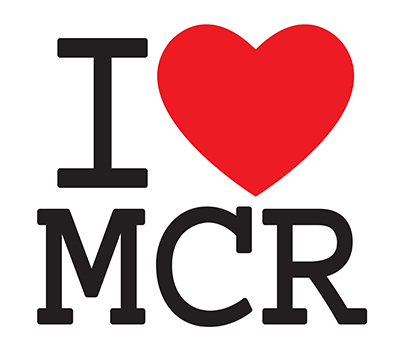 As entertainers, we (hopefully) bring a little joy and happiness to our audience. On the night of Tuesday 22nd May, the heart-breaking news began to break of the terrorism attack at The Manchester Arena after the Ariana Grande concert. I myself had just returned home from what seemed to be a particularly tough gig, but suddenly everything was put into perspective. The feelings of joy and happiness experienced by thousands at Manchester Arena would suddenly be replaced with feelings of fear, worry, terror and tragedy.
As entertainers, we (hopefully) bring a little joy and happiness to our audience. On the night of Tuesday 22nd May, the heart-breaking news began to break of the terrorism attack at The Manchester Arena after the Ariana Grande concert. I myself had just returned home from what seemed to be a particularly tough gig, but suddenly everything was put into perspective. The feelings of joy and happiness experienced by thousands at Manchester Arena would suddenly be replaced with feelings of fear, worry, terror and tragedy.
At least 22 people went out for a night of entertainment but sadly would never return home. Many more were injured, and thousands of concert goers, the majority of whom were children and teenagers, will never forget the horrific events of that night. It is hard to imagine the effect that night had on the brave staff at the venue who stayed to help, the emergency services who had to deal with the aftermath, and the hospital staff who treated the victims. Ariana tweeted that she was “broken from the bottom of my heart, I am so, so sorry. I don’t have words.” and has announced that she was to postpone the rest of her tour. She and her team of fellow entertainers and crew must be totally devastated that a wonderful night, sharing their talents of music and entertainment, ended so tragically. Finally, many of our members will have family or friends who work at The Arena, or who were affected by the terrible incident. I sincerely hope all are safe and well.

Given everything that happened, it was an extremely difficult decision whether to hold a meeting of The Order of The Magi in Manchester less than 24 hours later. Should we cancel the meeting or carry on in spite of the events the night before? Manchester Comedy Store cancelled a benefit show for fellow comedian Jim Taveré saying that “As much as we feel that people should carry on as normal we’re not sure that today is a good day for comedy”. This was an understandable sentiment in the circumstances.
The decision to hold society meeting certainly wasn’t made lightly, but I personally believe that the right decision was made. In this context, the saying “the show must go on” seems rather flippant, but perhaps it goes just a little way to express the spirit of the people of Manchester, those working in Show Business, and our members. To those who came to Geoff’s excellent lecture, thank you for your support. To those who didn’t (or couldn’t) attend the meeting for whatever reasons, it is of course very understandable. Each of us has to make a decision based on our own personal circumstances, feelings and beliefs.
At times such as these it’s important that we, as entertainers, keep entertaining; bringing a smile to those around us, a little joy and happiness. A world without entertainment would certainly be a terrible place. It can’t undo the terrible events of that night, but perhaps you can change the future, in a small, positive way. The world always needs a little magic!
“Believe something and the Universe is on its way to being change, because you’ve changed, by believing. Once you’ve changed, other things start to follow. Isn’t that the way it works?”
– Diane Duane, So You Want to Be a Wizard
Stay Safe & Keep Entertaining
Stuart Cassels
President
It’s All Greek To Me! The Origins of Modern Words in Entertainment & Magic
I am sure, like me, many of you will be familiar with this expression without knowing the real significance. It was only on a Classic Greece holiday that I found out just how many words we use every day in the English language actually have Greek origins.
Here are a few examples.
- Antiqua – antique, antiquity, ancient.
- Biblos – book, bible.
- Cosmos – (world) cosmopolitan.
- Dynamis – (power) dynamite, dynasty.
The list goes on, so what has all this to do with magic you are surely already asking. Well now having an interest in the subject I started to look up words relating to our art and found some interesting results.
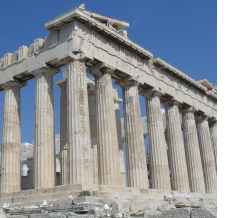 The first word that came to mind was morph(e) meaning shape or transforming bringing about metamorphosis – the substitution trunk.
The first word that came to mind was morph(e) meaning shape or transforming bringing about metamorphosis – the substitution trunk.
Scopos means watcher and leads to horoscope cinemascope etc (oops! etc that’s Latin).
Pyr or pyro means fire, hence pyrotechnics.
In Greek mythology the name Luna is sometimes used as a nickname for any goddess associated with the moon. Remember the Luna Trick – children’s effect a la die box.
I could go on but I feel our website will not have space for more than a page so I’ll finish with a few words from the entertainment world generally.
Cine means motion so we have cinema. The theatre name of Adelphi comes from Adelphoi meaning brothers. Presumably this refers to the brotherhood of actors appearing on the stage. Theatron (theatre) was a place where the audience of a Greek tragedy sat to watch the performance. Finally choreography appears to derive from khorus (chorus) and/or khoreia (dancing in unison). There you have it then, now it’s all Greek to you too!
Geoff Newton
Webmaster Note: I couldn’t leave this post without adding a favourite of mine – Hippodrome, from the Greek word Hippos – for Horse (and not Hippopotamus, which means “water horse”). Originally a Hippodrome was an ancient Grecian stadium for horse racing and chariot racing. The word was resurrected in Victorian and Edwardian times for buildings constructed specifically for animal & variety acts (such as the World Famous London Hippodrome, and more locally The Rochdale Hippodrome), which often became theatres in later years. Thank goodness they never raced hippopotamuses / hippopotami!
The modern word circus, now associated with entertainments such as clowns, jugglers, acrobats and magicians, originates from Roman horse racing tracks (circuits) which were very similar to Hippodromes. But as that is a Latin origin, and not Greek, it might be best to leave that for another post!
The Joe Abrahams Stage Competition Trophy
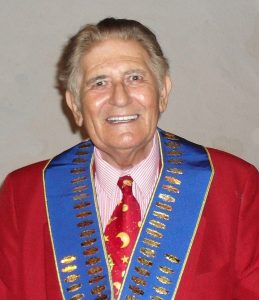
The late and much respected Past President Joe Abrahams
Thanks to all of you who were able to attend last night’s Magic Auction. Whether you were buyers, sellers or runners your participation was greatly appreciated. We received a good figure from the sale of Joe Abraham’s estate which will enable us to purchase a new trophy for the stage competition – “The Joe Abrahams Trophy” to be held later this year. Will you be the first to receive it? You’ve got to be in to win.
Joe was a very active member of the society, Treasurer and Past President, and it seems only fitting that the funds raised from the sale of his magical estate, kindly donated by his family, are used to purchase a new trophy, to remember him by.
We hope to see you all at Geoff Newton’s ‘Key Ring’ lecture on Tuesday 23rd May.
Finally if you are a society member and have not yet let Mike have your mobile number please do so in order that we can send text alerts to announce meetings, new etc.
The Order of The Magi Christmas Party 2016
The IBM British Ring President goes to The Order of The Magi Christmas Party
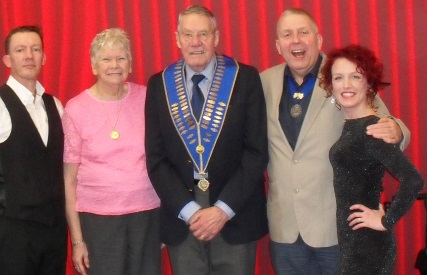
After a gruesome journey of roadworks and long delays on the motorway we arrived at the Irish World Heritage Centre in Manchester. This palatial venue with panoramic views over the city was the ideal location for a party.
As we arrived midst a general knowledge quiz which appeared to be very popular with the 60 or so guests present, we were formally introduced to President Alan Johnston who made us very welcome and was charming throughout the evening. Being in Manchester the meal was Lancashire hotpot which was delicious with good helpings all round. After this British Ring President Clive Moore drew the raffle in a humorous way.
Next, the cabaret, a delightful young couple Jez Mansfield and Emma, his started with a silent magical janitor act featuring the empty box routine which then produced Emma. After this Jez did some nice patter card work in a light hearted manner. The act was rounded off by the singing talents of Emma sat at the piano, with many songs she had written herself.
Next Geoff Newton introduced Bunny Holly and the Cricket Bats, a comedy stint featuring Mark Sharples dressed as a giant Rabbit.
The whole evening was a great success, very friendly and well organised Mike Sharples and Geoff Newton had done an excellent job throughout the whole evening hosting and compèring the event.
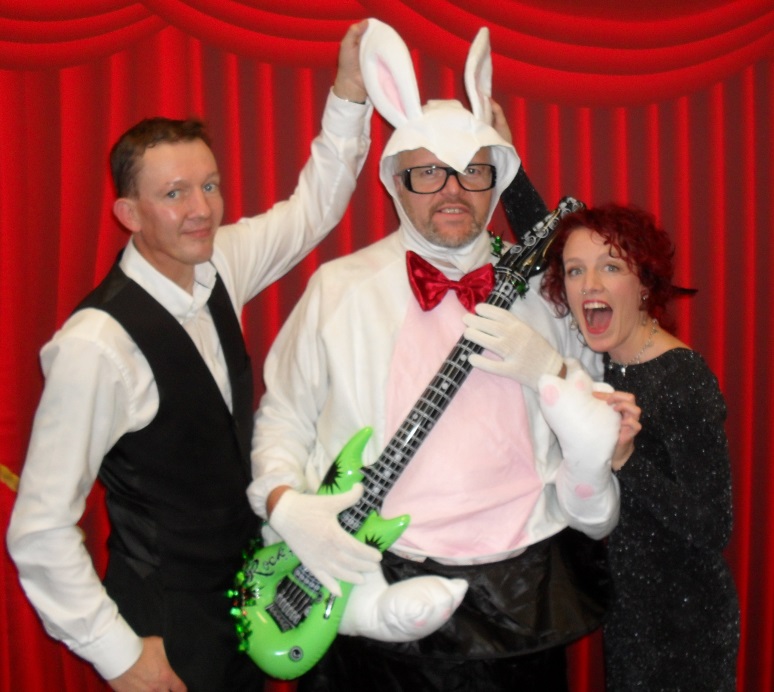
Jean Ellison
The Centenary Dinner & Cabaret
The Centenary Dinner & Cabaret – 31th March 2009
Report by Richard Blackie.
One hundred and fifty people attended this special event, and we were treated to a wonderful evening of celebrations with quality food and top class entertainment. Continue reading
The 100th Birthday Party Show
The 100th Birthday Party Show – 11th March 2009
by Geoffrey Newton, Public Relations Officer
An event like this, which of course only happens every one hundred years, has to be something special and it certainly was. “Team-Magi” certainly pulled out all the stops to make this a most memorable occasion. Continue reading
Magi Annual Dinner – 24th March 2006
Wow what a lovely evening. Where shall I start? At the beginning of the rainbow I think. We were welcomed into the Irish Centre with an overhead rainbow leading us into the dining hall which looked fantastic. Each table adorned with a golden pot and chocolate coins with cleverly created rainbows reaching upwards with the table number and pretty themed balloons swaying above. Continue reading
Annual Cabaret & Comedy Competition 2006
Annual Cabaret & Comedy Competition 2006
Wednesday 15th February saw the Magi host their annual cabaret & comedy competition. With the Magi being such a romantic bunch, it was decided to move the date back a day so that it didn’t clash with Valentines. Like last year we had 7 entrants competing for the awards
The outright winner for the evening was Nick Barnes, with Phil Tilston runner up. Continue reading
Manchester’s St. Patrick’s Day Parade 2006
Manchester’s St. Patrick’s Day Parade – 12th February 2006
On a freezing cold Sunday morning in Manchester, members of The Order of the Magi, their wives, partners, families and supporters could be found battling the wintry conditions to support Manchester’s St. Patrick’s Day Parade.
Manchester has hosted the UK’s largest parade for a number of years now and 2006 was no different. Continue reading